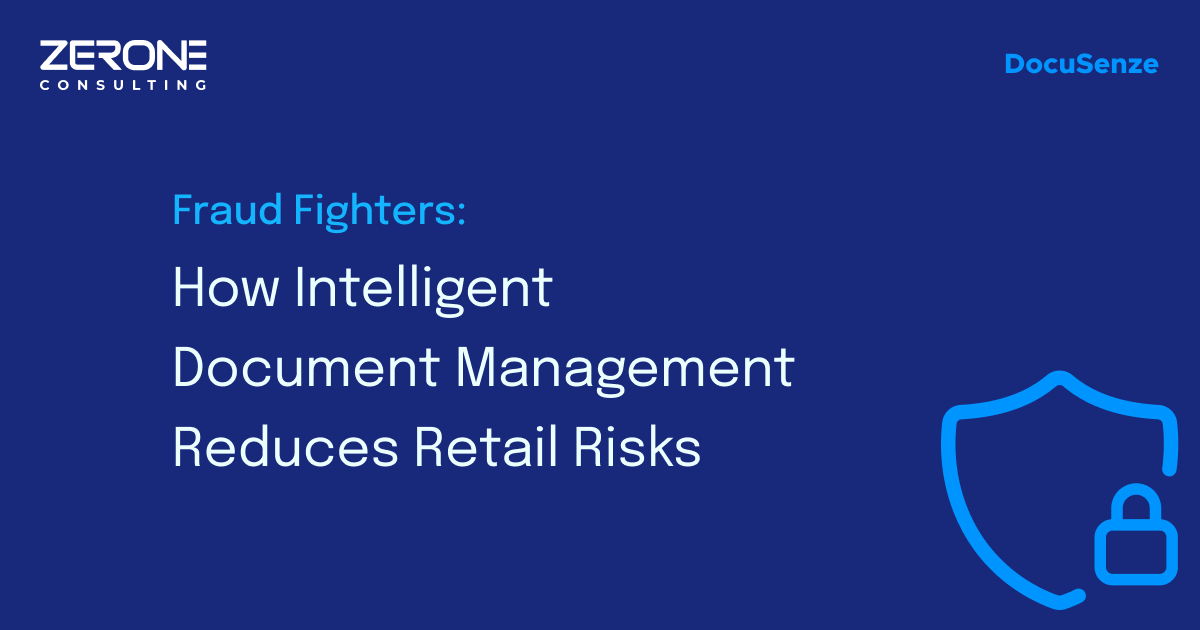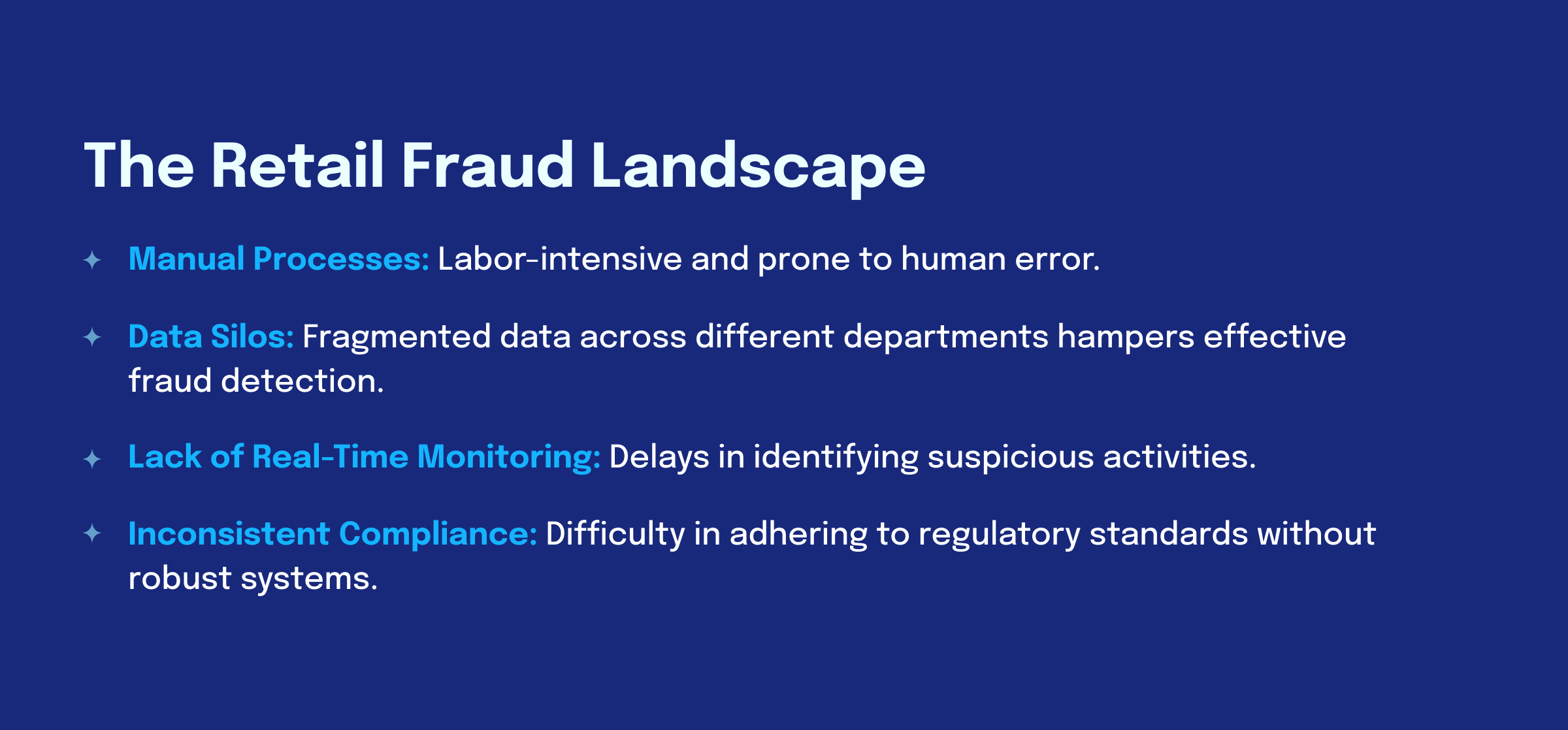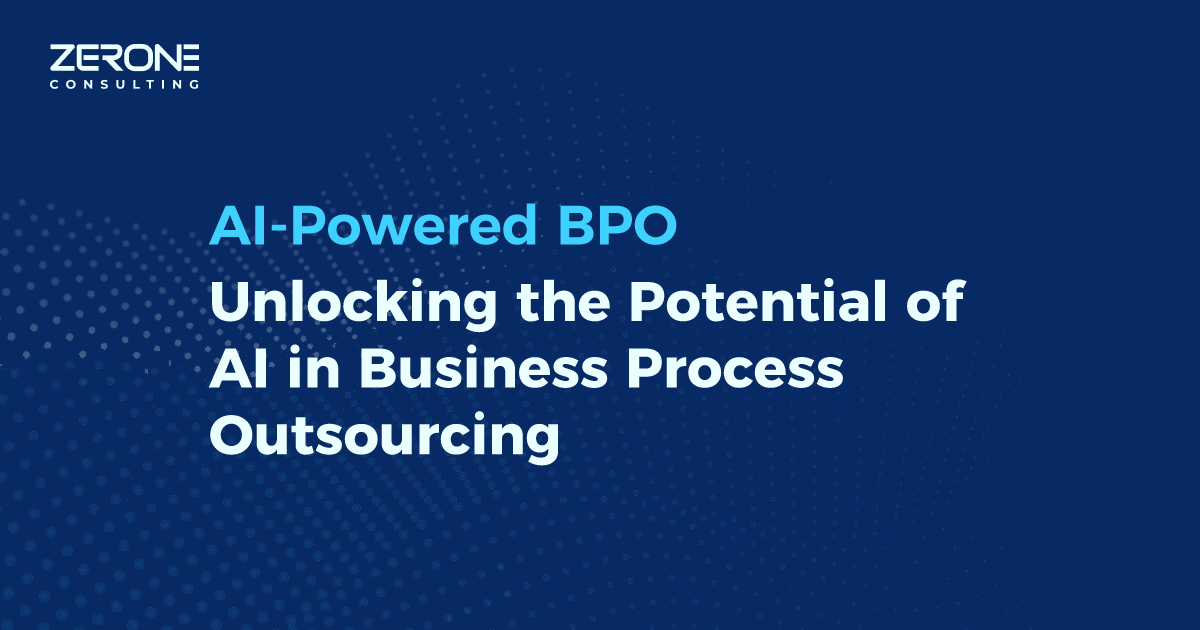Fraud Fighters: How Intelligent Document Management Reduces Retail Risks
In the competitive world of retail, fraud poses a significant threat to both profitability and reputation. Traditional methods of managing documents and transactions often fall short in identifying and mitigating fraudulent activities. However, the advent of intelligent document management systems (IDMS) offers a robust solution to this pressing issue. This blog explores how these advanced systems are transforming fraud prevention in retail, with insights on the latest developments, future trends, and critical statistics from authoritative sources like McKinsey, Forbes, Harvard Business Review (HBR), the World Economic Forum (WEF), and Deloitte.

The Retail Fraud Landscape
Retail fraud encompasses a range of activities, including return fraud, identity theft, and inventory shrinkage. According to a report by the National Retail Federation, the retail industry loses approximately $62 billion annually due to fraud. These losses not only impact financial health but also erode consumer trust, creating additional challenges for businesses aiming to maintain their reputations.

Pain Points in Traditional Systems
- Manual Processes: Labor-intensive and prone to human error.
- Data Silos: Fragmented data across different departments hampers effective fraud detection.
- Lack of Real-Time Monitoring: Delays in identifying suspicious activities.
- Inconsistent Compliance: Difficulty adhering to regulatory standards without robust systems.
Intelligent Document Management Systems: A New Era in Fraud Prevention
Intelligent document management systems (IDMS) leverage advanced technologies such as artificial intelligence (AI) and machine learning (ML) to enhance fraud detection and prevention. These systems offer real-time analysis, pattern recognition, and predictive capabilities, significantly reducing the risk of fraud. While the value of such systems is becoming increasingly recognized, it's how they function behind the scenes that offers businesses the best defense against fraud.
Key Features and Benefits of IDMS in Retail
- Automated Verification: IDMS can automatically verify documents against multiple databases, reducing the likelihood of fraudulent entries.
- Real-Time Monitoring: Continuous surveillance of transactions and activities to detect anomalies immediately.
- Pattern Recognition: AI algorithms identify suspicious patterns that human oversight might miss.
- Enhanced Compliance: Ensures adherence to regulations such as GDPR, reducing legal risks.
AI-Driven Fraud Detection: Changing the Game
AI-driven fraud detection is at the forefront of retail risk management. According to Forbes, retailers using AI for fraud detection can reduce false positives by up to 50%, improving accuracy and customer satisfaction. These systems are designed to analyze vast amounts of data, learning from each transaction to become more effective over time. By integrating intelligent document management systems into fraud prevention strategies, retailers can harness the power of AI to stay ahead of evolving threats.
The Power of Blockchain Integration
Blockchain technology is gaining traction in enhancing the security of retail transactions. The World Economic Forum highlights that blockchain's immutable ledger can ensure transaction authenticity and reduce fraud. When integrated with intelligent document management systems, blockchain can create a tamper-proof record of all transactions, significantly reducing the chances of fraudulent activities going undetected.
Predictive Analytics: The Next Step in Proactive Fraud Prevention
Predictive analytics, powered by machine learning, allows retailers to forecast potential fraud scenarios based on historical data. Harvard Business Review notes that predictive analytics can increase fraud detection rates by 30%, enabling retailers to take proactive measures rather than reacting after the fact. For retail businesses, the ability to predict and prevent fraud before it occurs represents a significant advantage in a highly competitive market.
Real-World Impact: Statistics and Case Studies
- Cost Savings: McKinsey reports that adopting AI and ML for fraud prevention can reduce fraud-related losses by up to 25%.
- Market Growth: The global market for AI in fraud management is projected to reach $19 billion by 2026, according to Forbes.
- Improved Compliance: Deloitte's research indicates that companies using advanced fraud detection systems report a 20% improvement in regulatory compliance.
Case Study: A Leading Retailer's Fraud Prevention Transformation
One international retailer, facing recurring inventory fraud, implemented an intelligent document management system integrated with AI and blockchain technologies. Within the first year, the company saw a 40% reduction in inventory discrepancies. The system's ability to monitor transactions in real-time and identify suspicious patterns played a crucial role in significantly reducing fraudulent activities. This case exemplifies how IDMS can transform fraud prevention strategies, providing a robust shield against threats while enhancing operational efficiency.
Looking to the Future: What's Next for Fraud Prevention?
The future of fraud prevention in retail lies in further advancements in AI, blockchain, and data analytics. As these technologies evolve, they will offer even more sophisticated tools for identifying and preventing fraudulent activities. Future iterations of AI, particularly those incorporating deep learning, will provide even more nuanced detection capabilities, understanding the context of transactions and identifying fraud with greater precision. Likewise, blockchain technology will continue to evolve, offering enhanced features such as smart contracts that automatically enforce compliance and detect fraud in real-time.

Embracing Intelligent Document Management
For retail business owners and decision-makers, embracing intelligent document management systems is no longer optional—it's essential. These systems provide powerful tools to combat fraud, ensuring the integrity of transactions and the security of sensitive information. By staying ahead of technological advancements and integrating these innovative solutions into their operations, retailers can protect their bottom line and maintain consumer trust.
As fraud continues to pose an ever-present threat, intelligent document management systems stand as the front-line defense, transforming the way retail operates and paving the way for a more secure future.
Mercedes Benz Engine In A Second Hand 15-year-old Economic Car
#Artificialintelligence
One Functional Prototype Is Better Than A Thousand Wireframes
#Artificialintelligence
Unlocking The Potential Of Ai In Business Process Outsourcing
#Artificialintelligence


